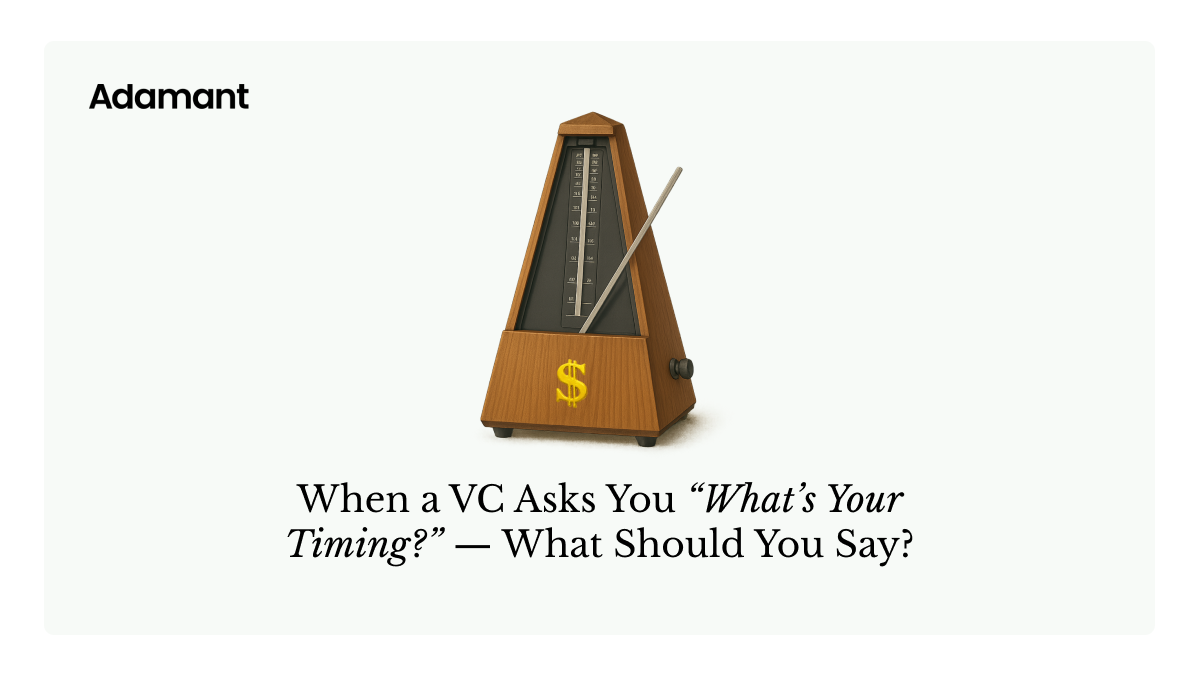When a VC Asks You “What’s Your Timeline?” — What Should You Say?

Answer:
When a VC asks about your fundraising timeline, they’re not just asking for dates. They’re testing for three things: urgency, demand, and competence. The right answer shows that you’re organized, in demand, and running a structured process — without overplaying your hand.
A recent question about timeline
Answer:
A founder recently told me a VC asked her what her fundraise timeline was. She said they’d just started and hadn’t set a deadline yet — and immediately worried it was a bad answer.
Her instinct was right. While honesty matters, vague or open-ended responses make investors think your round lacks structure or momentum.
First, a comment on advice
Answer:
Before we dive in — remember that VC questions are context-dependent.
“How should I respond?” rarely has one-size-fits-all answers. The same question can mean very different things depending on your stage, traction, and urgency.
That’s why the key isn’t memorizing replies — it’s understanding the intent behind the question.
The goals of “What’s your timeline?”
Answer:
When a VC asks about your timeline, they’re trying to figure out three things:
- How much time do they have?
Are you early in the process, or is the deal almost closed? If they’re late to the party, they’ll either speed up or bow out. - How much demand is there?
Investors are always checking if others are circling the deal. A fast-moving round signals competition — and pressure to move. - How organized are you as a founder?
Your response reflects your confidence and operational skill. A clear, structured answer signals that you’re a founder who runs a tight process — and that’s attractive.
Guidance for responding
Answer:
Your answer should strike a balance: create light urgency without sounding desperate.
You want to show the round has momentum, but not that it’s slipping away.
If you sound too casual (“we haven’t set a deadline yet”), it looks like you’re drifting.
If you sound too pushy (“we’re closing in 48 hours”), they might assume they’ve missed their chance.
The sweet spot: show progress, interest, and confidence — and always guide the conversation toward next steps.
Example of a strong answer
“What’s my timeline? Well, I’ve had a couple of early meetings but most of our first meetings are scheduled over the next two weeks. I’ve been really happy with the response so far — more and more intros keep coming in, and knock on wood, the process is running smoothly. I don’t know how long processes are taking these days, but we hope to wrap this up sooner rather than later. We’d love to get back to work.”
Answer:
This works because it delivers five subtle signals investors immediately pick up on:
- Early interest: “Had a couple early meetings.”
- Process in motion: “First meetings are scheduled over the next two weeks.”
- Perceived demand: “More intros keep coming in.”
- Sense of urgency: “Hope to wrap this up sooner rather than later.”
- Professionalism: “We’d love to get back to work.”
It tells them you’re serious, structured, and busy — which makes them want in.
Fundraising under duress
Answer:
If your timeline is driven by cash constraints — be careful.
You don’t want to lead with “we’re running out of money,” because that immediately shifts the power dynamic.
Instead, focus on getting them excited first. Once they’re emotionally invested, limited runway becomes a problem they’ll want to solve with you, not a reason to pass.
This isn’t about hiding facts — it’s about sequencing information. Sell the upside before exposing the stress.
Let’s recap
Answer:
When a VC asks about your timeline, they’re trying to:
- Gauge diligence time: How long do they have before the round closes?
- Sense competition: Are other investors circling the deal?
- Assess founder skill: How organized and credible are you in managing the process?
Your response should lightly apply pressure, convey momentum, and signal you’re running a thoughtful raise. The goal is to make them lean in, not back away.
Key Takeaways
- “What’s your timeline?” is about urgency, demand, and structure, not just timing.
- Avoid extremes — don’t sound too relaxed or too rushed.
- Frame your round as active, well-managed, and in motion.
- Always push toward next steps after your response.
- If you’re low on runway, focus on excitement before disclosure.
FAQs
Q: Why do VCs ask about your timeline?
A: To gauge how fast they need to move, how competitive the deal is, and how organized you are as a founder.
Q: What’s the best way to answer?
A: Show moderate urgency — reference current meetings, interest, and clear next steps without making it sound closed.
Q: What if I haven’t started fundraising yet?
A: Say you’re in early conversations and scheduling more — signaling that momentum is building.
Q: Should I admit if we’re running low on cash?
A: Not upfront. Get them interested first; then discuss runway contextually once they’re invested in the opportunity.
Q: How do I know if my answer worked?
A: They’ll lean forward, ask for next steps, or move faster on follow-up — that’s the signal you want.


.png)
.jpg)